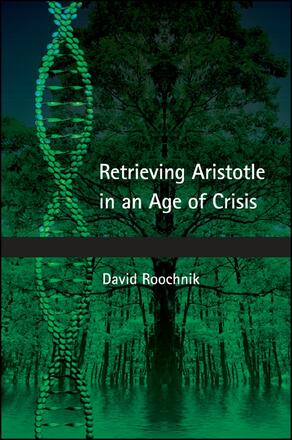
Retrieving Aristotle in an Age of Crisis
Alternative formats available from:
An urgent, contemporary defense of Aristotle
Description
In 1935 Edmund Husserl delivered his now famous lecture "Philosophy and the Crisis of European Humanity," in which he argued that the "misguided rationalism" of modern Western science, dominated by the model of mathematical physics, can tell us nothing about the "meaning" of our lives. Today Husserl's conviction that the West faces a crisis is no longer an abstraction. With the ever-present threat of nuclear explosion, the degradation of the oceans, and the possibility that climate change will wreak havoc on civilization itself, people from all walks of life are wondering what has gone so terribly wrong and what remedies might be available.
In Retrieving Aristotle in an Age of Crisis, David Roochnik makes a lucid and powerful case that Aristotle offers a philosophical resource that even today can be of significant therapeutic value. Unlike the scientific revolutionaries of the seventeenth century, he insisted that both ordinary language and sense-perception play essential roles in the acquisition of knowledge. Centuries before Husserl, Aristotle was a phenomenologist who demanded that a successful theory remain faithful to human experience. His philosophy can thus provide precisely what modern European rationalism now so painfully lacks: an understanding and appreciation of the world in which human beings actually make their homes.
David Roochnik is Professor of Philosophy at Boston University. His books include Retrieving the Ancients: An Introduction to Greek Philosophy and Beautiful City: The Dialectical Character of Plato's Republic.
Reviews
"…[Roochnik's] investigation is a welcome addition to this pivotal topic." — International Journal of the Classical Tradition
"Roochnik has an easy grasp of Aristotelian scholarship and presents his exegesis of the texts clearly in defense of his claim that Aristotle provides an 'as-we-experience-it' understanding of the world that is both accurate and valuable. Against a host of critics and conversation partners, from Francis Bacon to Richard Dawkins and from Daniel Gilbert to John Rawls, Roochnik offers a coherent and intriguing polemic, both scholarly and surprising." — CHOICE
"Roochnik's thorough development of the protophenomenological character of Aristotle's work is by far the most detailed I know of, and this enables him to mount a defense of Aristotle's relevance today that is as strong as I have read. Moreover, the polemical, passionate, and personal style is a welcome change from the dryness of too much Aristotle scholarship." — Drew A. Hyland, author of Plato and the Question of Beauty